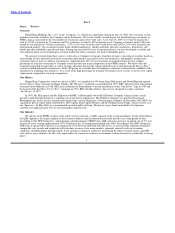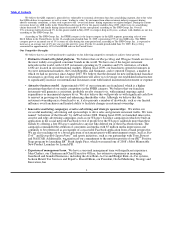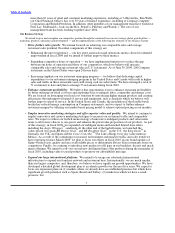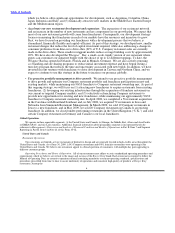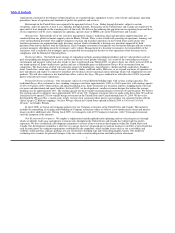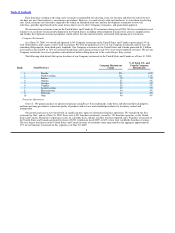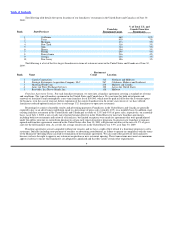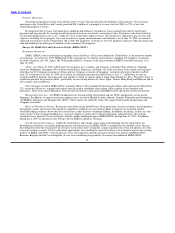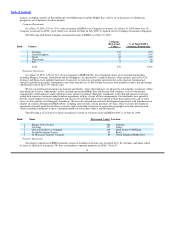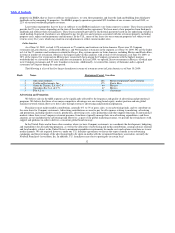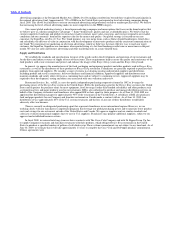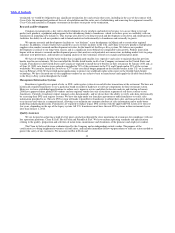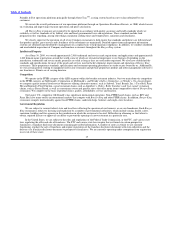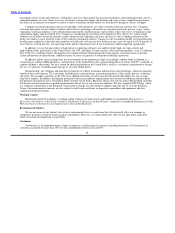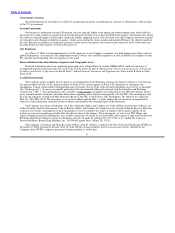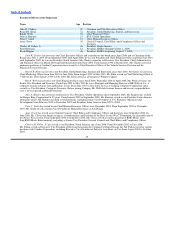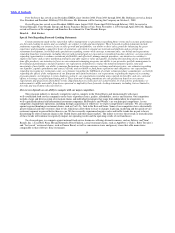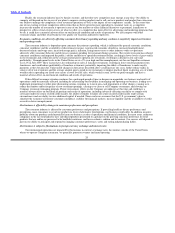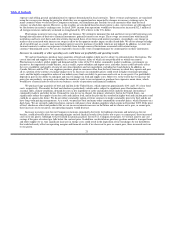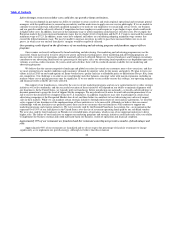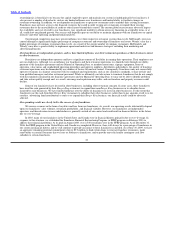Burger King 2009 Annual Report Download - page 15
Download and view the complete annual report
Please find page 15 of the 2009 Burger King annual report below. You can navigate through the pages in the report by either clicking on the pages listed below, or by using the keyword search tool below to find specific information within the annual report.
Table of Contents
advertising campaigns at the Designated Market Area (DMA) level by making contributions beyond those required for participation in
the national advertising fund. Approximately 72% of DMAs in the United States participated in local advertising campaigns during
fiscal 2009. This allows local markets to execute customized advertising and promotions to deliver market specific tactics. We believe
that increasing the level of local advertising makes us more competitive in the FFHR category.
Our current global marketing strategy is based upon marketing campaigns and menu options that focus on the brand equities that
we believe give us a distinct competitive advantage — flame−broiled taste, quality and size at affordable prices. We believe that the
current competitive landscape and global recession have made customers more value−conscious, and we must respond to new market
conditions and our customers’ demand for superior value for the money and quality. Our global strategy is focused on our core
consumer, the SuperFan, our Have It Your Way brand promise, our core menu items, such as flame−broiled hamburgers, french fries
and soft drinks, the delivery of value in conjunction with the development of innovative products and the consistent communication of
our brand. We concentrate our marketing on television advertising, which we believe is the most effective way to reach our target
customer, the SuperFan. SuperFans are consumers who reported eating at a fast food hamburger outlet nine or more times in the past
month. We also use radio and Internet advertising and other marketing tools on a more limited basis.
Supply and Distribution
We establish the standards and specifications for most of the goods used in the development and operation of our restaurants and
for the direct and indirect sources of supply of most of those items. These requirements help us assure the quality and consistency of the
food products sold at our restaurants and protect and enhance the image of the Burger King system and the Burger King brand.
In general, we approve the manufacturers of the food, packaging and equipment products and other products used in Burger King
restaurants, as well as the distributors of these products to Burger King restaurants. Franchisees are generally required to purchase these
products from approved suppliers. We consider a range of criteria in evaluating existing and potential suppliers and distributors,
including product and service consistency, delivery timeliness and financial condition. Approved suppliers and distributors must
maintain standards and satisfy other criteria on a continuing basis and are subject to continuing review. Approved suppliers may be
required to bear development, testing and other costs associated with our evaluation and review.
Restaurant Services, Inc., or RSI, is a not−for−profit, independent purchasing cooperative formed in 1992 to leverage the
purchasing power of the Burger King system in the United States. RSI is the purchasing agent for the Burger King system in the United
States and negotiates the purchase terms for most equipment, food, beverages (other than branded soft drinks) and other products such
as promotional toys and paper products used in our restaurants. RSI is also authorized to purchase and manage distribution services on
behalf of the Company restaurants and franchisees who appoint RSI as their agent for these purposes. As of June 30, 2009, RSI was
appointed the distribution manager for approximately 94% of the restaurants in the United States. A subsidiary of RSI also purchases
food and paper products for our Company and franchise restaurants in Canada under a contract with us. As of June 30, 2009, four
distributors service approximately 85% of the U.S. system restaurants and the loss of any one of these distributors would likely
adversely affect our business.
There is currently no designated purchasing agent that represents franchisees in our international regions. However, we are
working closely with our franchisees to implement programs that leverage our global purchasing power and to negotiate lower product
costs and savings for our restaurants outside of the United States and Canada. We approve suppliers and use similar standards and
criteria to evaluate international suppliers that we use for U.S. suppliers. Franchisees may propose additional suppliers, subject to our
approval and established business criteria.
In fiscal 2000, we entered into long−term exclusive contracts with The Coca−Cola Company and with Dr Pepper/Seven Up, Inc.
to supply Company restaurants and franchise restaurants with their products, which obligate Burger King restaurants in the United
States to purchase a specified number of gallons of soft drink syrup. These volume commitments are not subject to any time limit. As of
June 30, 2009, we estimate that it will take approximately 13 years to complete the Coca−Cola and Dr Pepper purchase commitments.
If these agreements were
13


